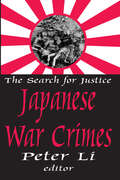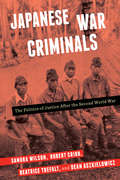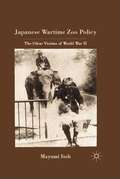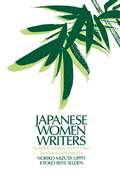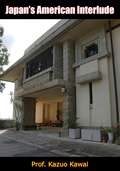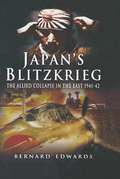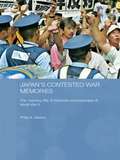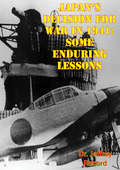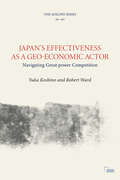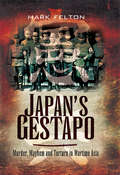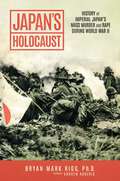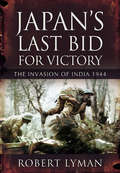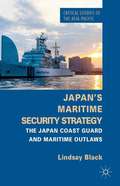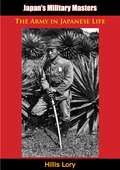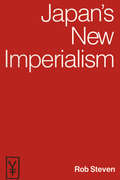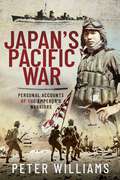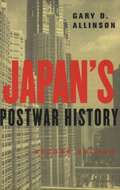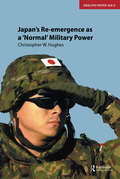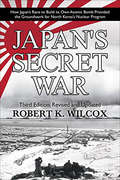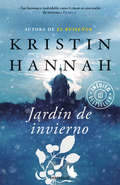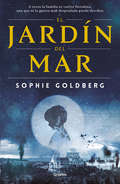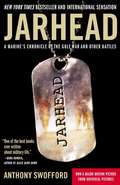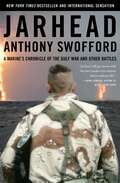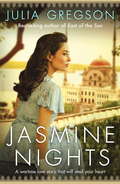- Table View
- List View
Japanese War Crimes
by Peter LiThe question of national responsibility for crimes against humanity became an urgent topic due to the charge of ethnic cleansing against the previous Yugoslav government. But that was not the first such urging of legal and moral responsibility for war crimes. While the Nazi German regime has been prototypical, the actions of the Japanese military regime have been receiving increasing prominence and attention. Indeed, Peter Li's volume examines the phenomenon of denial as well as the deeds of destruction.Certainly one of the most troublesome unresolved problems facing many Asian and Western countries after the Asia Pacific war (1931u1945) is the question of the atrocities committed by the Japanese Imperial Army throughout Asia and the Japanese government's repeated attempts to whitewash their wartime responsibilities. The psychological and physical wounds suffered by victims, their families, and relations remain unhealed after more than half a century, and the issue is now pressing. This collection undertakes the critical task of addressing some of the multifaceted and complex issues of Japanese war crimes and redress.This collection is divided into five themes. In "It's Never Too Late to Seek Justice," the issues of reconciliation, accountability, and Emperor Hirohito's responsibility for war crimes are explored. "The American POW Experience Remembered" includes a moving account of the Bataan Death March by an American ex-soldier. "Psychological Responses" discusses the socio-psychological affects of the Nanjing Massacre and Japanese vivisection on Chinese subjects. The way in which Japanese war atrocities have been dealt with in the theater and cinema is the focus of "Artistic Responses." And central to "History Must not Forget" are the questions of memory, trauma, biological warfare, and redress. Included in this volume are samples of the many presentations given at the International Citizens' Forum on War Crimes and Redress held in Tokyo in Decem
Japanese War Criminals: The Politics of Justice After the Second World War
by Sandra Wilson Robert Cribb Beatrice Trefalt Dean AszkielowiczBeginning in late 1945, the United States, Britain, China, Australia, France, the Netherlands, and later the Philippines, the Soviet Union, and the People's Republic of China convened national courts to prosecute Japanese military personnel for war crimes. The defendants included ethnic Koreans and Taiwanese who had served with the armed forces as Japanese subjects. In Tokyo, the International Military Tribunal for the Far East tried Japanese leaders. While the fairness of these trials has been a focus for decades, Japanese War Criminals instead argues that the most important issues arose outside the courtroom. What was the legal basis for identifying and detaining subjects, determining who should be prosecuted, collecting evidence, and granting clemency after conviction? The answers to these questions helped set the norms for transitional justice in the postwar era and today contribute to strategies for addressing problematic areas of international law. Examining the complex moral, ethical, legal, and political issues surrounding the Allied prosecution project, from the first investigations during the war to the final release of prisoners in 1958, Japanese War Criminals shows how a simple effort to punish the guilty evolved into a multidimensional struggle that muddied the assignment of criminal responsibility for war crimes. Over time, indignation in Japan over Allied military actions, particularly the deployment of the atomic bombs, eclipsed anger over Japanese atrocities, and, among the Western powers, new Cold War imperatives took hold. This book makes a unique contribution to our understanding of the construction of the postwar international order in Asia and to our comprehension of the difficulties of implementing transitional justice.
Japanese Wartime Zoo Policy
by Mayumi ItohThis book examines Japanese wartime zoo policy during World War II, analyzing the reasons why the Home Ministry destroyed more than 300 showpiece animals throughout Japan well before U. S. air strikes were anticipated, with international comparisons of the effects of the war on zoos in Europe, the United States, and the Middle East.
Japanese Women Writers: Twentieth Century Short Fiction (Japan In The Modern World Ser.)
by Kyoko Iriye Selden Noriko Mizuta Lippit"Here are Japanese women in infinite and fascinating variety -- ardent lovers, lonely single women, political activists, betrayed wives, loyal wives, protective mothers, embittered mothers, devoted daughters. ... a new sense of the richness of Japanese women's experience, a new appreciation for feelings too long submerged". -- The New York Times Book Review
Japan’s American Interlude
by Prof. Kazuo KawaiHow did the Japanese themselves respond to the American occupation? How were the sweeping reforms—political, social, and economic—of SCAP’s program received? How permanent was their effect, and why did some succeed and others fail completely? How successful in the long view was the democratization induced by MacArthur’s “artificial revolution”? And what tendencies existing in fundamental Japanese attitudes and history might account for this peculiar success?Kazuo Kawai, Japanese-born and educated in America, a political scientist and journalist, brings his unique experience and knowledge to bear on these questions. The result is a book which tells the story of the American occupation of Japan from the Japanese point of view.“This book deals with the American interlude in the history of Japan during which time that country was not only occupied by American troops and politically controlled by American officials but was subjected to almost every conceivable variety of American influence. It does not attempt to tell the story of the Occupation itself, for that story has already been told many times by Americans who, as participants or close observers, were in a position to tell it well. Instead, this work deals only with selected controversial aspects of the Japanese reaction to American influence during the Occupation period.”—Kazuo Kawai, Preface
Japans Blitzkrieg: The Allied Collapse in the East, 1941–42
by Bernard EdwardsEarly on the morning of 7 December 1941, 360 Japanese carrier-borne aircraft made a surprise attack on the US naval base at Pearl Harbor, and laid waste to the American Far East Fleet. They sank four battleships, crippled three cruisers and three destroyers, and seriously damaged two other battleships. One hundred and sixty-four planes were destroyed and 2,403 servicemen and civilians were killed. All for the loss of twenty-nine Japanese aircraft and fifty-five men. Two days later, the British battleships Prince of Wales and Repulse, were sunk by Japanese torpedo bombers as they raced north to intercept an enemy invasion force heading for Malaya. In these two bold forays, the Japanese had successfully emasculated Allied naval power in the East. There now remained no big guns afloat anywhere in the Pacific and Indian oceans capable of opposing Admiral Yamamoto's ships.So began Japan's blitzkrieg. The Malay peninsular was rapidly overwhelmed, Hong Kong surrendered on Christmas Day, Manila went the same way on the 31st, and on 15 February 1942, in one of the most ignominious defeats in modern warfare, 85,000 British troops laid down their arms, and the vital base of Singapore was in Japanese hands. Thereafter, the rays of the Rising Sun spread ever outwards, overrunning island after island, until even Australia was threatened. The book tells how the Dutch Spice Islands, Java and Sumatra, became a last refuge for those fleeing before the Japanese whirlwind advance, and it was from here that the remaining Allied merchant ships in the area made their bid for freedom carrying hundreds of refugees. For many of these ships it was to be their last voyage
Japan's Contested War Memories: The 'Memory Rifts' in Historical Consciousness of World War II (Routledge Contemporary Japan Series #10)
by Philip A. SeatonJapan's Contested War Memories is an important and significant book that explores the struggles within contemporary Japanese society to come to terms with Second World War history. Focusing particularly on 1972 onwards, the period starts with the normalization of relations with China and the return of Okinawa to Japan in 1972, and ends with the sixtieth anniversary commemorations. Analyzing the variety of ways in which the Japanese people narrate, contest and interpret the past, the book is also a major critique of the way the subject has been treated in much of the English-language. Philip Seaton concludes that war history in Japan today is more divisive and widely argued over than in any of the other major Second World War combatant nations. Providing a sharp contrast to the many orthodox statements about Japanese 'ignorance', amnesia' and 'denial' about the war, this is an engaging and illuminating study that will appeal to scholars and students of Japanese history, politics, cultural studies, society and memory theory.
Japan’s Decision For War In 1941: Some Enduring Lessons - War College Series
by Dr Jeffrey RecordJapan's decision to attack the United States in 1941 is widely regarded as irrational to the point of suicidal. How could Japan hope to survive a war with, much less defeat, an enemy possessing an invulnerable homeland and an industrial base 10 times that of Japan? The Pacific War was one that Japan was always going to lose, so how does one explain Tokyo's decision? Did the Japanese recognize the odds against them? Did they have a concept of victory, or at least of avoiding defeat? Or did the Japanese prefer a lost war to an unacceptable peace?Dr. Jeffrey Record takes a fresh look at Japan's decision for war, and concludes that it was dictated by Japanese pride and the threatened economic destruction of Japan by the United States. He believes that Japanese aggression in East Asia was the root cause of the Pacific War, but argues that the road to war in 1941 was built on American as well as Japanese miscalculations and that both sides suffered from cultural ignorance and racial arrogance. Record finds that the Americans underestimated the role of fear and honor in Japanese calculations and overestimated the effectiveness of economic sanctions as a deterrent to war, whereas the Japanese underestimated the cohesion and resolve of an aroused American society and overestimated their own martial prowess as a means of defeating U.S. material superiority. He believes that the failure of deterrence was mutual, and that the descent of the United States and Japan into war contains lessons of great and continuing relevance to American foreign policy and defense decision-makers.
Japan's Economic Planning and Mobilization in Wartime, 1930s-1940s
by Yoshiro MiwaAlthough most economists maintain a (justifiable) mistrust of a government's goals when it intervenes in an economy, many continue to trust its actual ability. They retain, in other words, a faith in state competence. For this faith, they adduce no evidence. Sharing little skepticism about the government ability, they continue to expect the best of governmental intervention. To study government competence in World War II Japan offers an intriguing laboratory. After all, governments direct wars. They decide whether to prepare for them, when to initiate them, how to execute them, and the terms on which to end them. Toward that end, the public sometimes grants them as much power as it can feasibly grant. And in Japan during World War II, the public granted the state the maximum power. In this book, Yoshiro Miwa shows that the Japanese government did not conduct requisite planning for the war by any means. It made its choices on an ad hoc basis, and the war itself quickly became a dead end. That the government planned for the war incompetently casts doubts on the accounts of Japanese government leadership more generally.
Japan’s Effectiveness as a Geo-Economic Actor: Navigating Great-Power Competition (Adelphi series)
by Yuka Koshino Robert WardGeo-economic strategy – deploying economic instruments to secure foreign-policy aims and to project power – has long been a key element of statecraft. In recent years, it has acquired even greater salience given China’s growing antagonism with the United States and the willingness of both Beijing and Washington to wield economic power in their confrontation. This trend has particular significance for Japan given its often tense political relationship with China, which remains its largest trading partner. While Japan’s post-war geo-economic performance often failed to match its status as one of the world’s largest economies, more recently Tokyo has demonstrated increased geo-economic agency and effectiveness. In this Adelphi book, Yuka Koshino and Robert Ward draw on multiple disciplines – including economics, political economy, foreign policy and security policy – and interviews with key policymakers to examine Japan’s geo-economic power in the context of great-power competition between the US and China. They examine Japan’s previous underperformance, how Tokyo’s understanding of geo-economics has evolved and, given constraints on its national power-projection, what actions Japan might feasibly take to become a more effective geo-economic actor. Their conclusions will be of direct interest not only for all those concerned with Japanese grand strategy and the Asia-Pacific, but also for those middle powers seeking to navigate great-power competition in the coming decades.
Japan’s Gestapo: Murder, Mayhem and Torture in Wartime Asia
by Mark FeltonThe book opens by explaining the origins, organisation and roles of the Kempetai apparatus, which exercised virtually unlimited power throughout the Japanese Empire. The author reveals their criminal and collaborationist networks, which extorted huge sums of money from hapless citizens and business. They ran the Allied POW gulag system which treated captives with brutality and a complete lack of mercy.Other Kempetai activities included biological and chemical experiments on live subjects, slave labour, including 'Comfort Women' drawn from all races.Their record of reprisals against military and civilians was unrelenting. For example Colonel Doolittle's raid on Tokyo in 1942 resulted in a campaign of revenge not just against captured airmen but thousands of Chinese civilians. Their actions amounted to genocide on a grand scale.Of particular distaste is the revelation of the Maruta vivisection campaign.The author backs up his text with first hand testimonies from those survivors who suffered at the hands of this evil organization. He examines how the guilty were bought to justice and the resulting claims for compensation.
Japan's Holocaust: History of Imperial Japan's Mass Murder and Rape During World War II
by Bryan Mark RiggJapan&’s Holocaust is a comprehensive exploration of Japan&’s mass murder and sexual crimes during the Pacific and Asian Wars from 1927 to 1945.Japan&’s Holocaust combines research conducted in over eighteen research facilities in five nations to explore Imperial Japan&’s atrocities from 1927 to 1945 during its military expansions and reckless campaigns throughout Asia and the Pacific. This book brings together the most recent scholarship and new primary research to ascertain that Japan claimed a minimum of thirty million lives, slaughtering far more than Hitler&’s Nazi Germany. Japan&’s Holocaust shows that Emperor Hirohito not only knew about the atrocities his legions committed, but actually ordered them. He did nothing to stop them when they exceeded even the most depraved person&’s imagination, as illustrated during the Rape of Nanking as well as many other events. Japan&’s Holocaust will document in painful detail that the Rape of Nanking was not an isolated event during the Asian War but rather representative of how Japan behaved for all its campaigns throughout Asia and the Pacific from 1927 to 1945.Mass murder, rape, and economic exploitation was Japan&’s modus operandi during this time period, and whereas Hitler&’s SS Death&’s Head outfits attempted to hide their atrocities, Hirohito&’s legions committed their atrocities out in the open with fanfare and enthusiasm. Moreover, whereas Germany has done much since World War II to atone for its crimes and to document them, Japan has been absolutely disgraceful with its reparations for its crimes and in its efforts to educate its population about its wartime past. Shockingly, Japan continues, in general, to glorify is criminals and its wartime past.
Japan's Last Bid for Victory: The Invasion of India, 1944
by Robert LymanEven by SAS standards this is the story of an outstanding warrior.On the point of being demobbed from the SAS, Fred Marafono was recruited by David Stirling for his private security company. After Stirlings death, Fred found himself in the midst of Sierra Leones Blood Diamond wars, and formed an unbreakable bonding with the countrys champion of democracy, Chief Hinga Norman, whose leadership and tragic death are integral to the story.Fred was recruited by Simon Mann for the finest of all private military companies in Africa, Executive Outcomes. Fewer than two hundred of them defeated the rebels in their strongholds. Through political weakness, Executive Outcomes were made to leave the country, and chaos ensued. Committed men like Hinga Norman and British High Commissioner Peter Penfold saw that in the absence of military commitment from the west, only high caliber mercenaries would win the fight to restore democracy: three of them kept a vital air bridge open ? What God abandoned, these defended. Freds final action was supporting the SAS in their brilliant hostage release, Operation Barras.Peter Penfold sums it all up in the books foreword, writing of the, confidence, trust and admiration I have for this remarkable man.
Japan�s Maritime Security Strategy
by Lindsay BlackIn recent times, international society has countered a myriad of 'outlaw' threats at sea, including piracy, terrorism, the proliferation of Weapons of Mass Destruction (WMD) and the threat posed by 'rogue states'. Whilst the US has promoted 'coalitions of the willing' and sought to transform international maritime law in response to these 'outlaws', Japanese governments have developed an innovative maritime security strategy centering on the Japan Coast Guard (JCG). Concerned by Japan's international image as a former imperialist power, Tokyo has relied upon the identity of the JCG as a law enforcement and rescue organization to garner support for its maritime security strategy. Japan's non-military efforts have developed the capacities of states and built institutions in the Southeast Asian region and beyond. The JCG's response to maritime 'outlaws' belies characterizations of Japan as a passive state that does not contribute to international order.
Japan’s Military Masters: The Army in Japanese Life
by Hillis LoryTHE REALISTIC FACTS ABOUT JAPAN’S CAPACITY—IN MANPOWER AND IN NATIONAL MORALE—TO FIGHT THE “HOLY WAR” HER MILITARY LEADERS HAVE SO LONG PLANNED FOR HERIn Japanese Military Masters: The Army in Japanese Life, author Hillis Lory answers fundamental questions in satisfactory detail. He describes the life and though of the peasant, the motives and personalities of the men close to the Throne. He traces the evolution of Japanese government from feudalism to modern power politics. He records the assassinations, the rebellions, the secret societies, the coups d’état that have shaped it. He recalls the struggle between the liberal and the military leaders for control of Japan’s destiny.“Among the many books about Japan that have appeared since Pearl Harbor, this book is one of the few that could fairly be called indispensable for its high informational content. The author has learned about as much as any foreign could learn about the organization and psychology and training and general make-up of the Japanese Army. And he puts his material together in the style of a good military report, without padding and exaggeration.—The New York Times Book Review
Japan's New Imperialism (Japan In The Modern World Ser.)
by Rob StevenA full scale examination of the 1979 Sino-Vietnamese War - the events that led to it, the Cold War aftermath, and the implications for the region and beyond.
Japan's Pacific War: Personal Accounts of the Emperor's Warriors
by Peter Williams‘I had no qualms fighting the Australians, just as I have killed without remorse any of the Emperor’s enemies: the British, the Americans and the Dutch’, so admits Takahiro Sato in this ground-breaking oral history of Japan’s Pacific War. Thanks to years of research and over 100 interviews with veterans, the Author has compiled a fascinating collection of personal accounts by former Japanese soldiers, sailors and airmen. Their candid views are often provocative and shocking. There are admissions of brutality, the killing of prisoners and cannibalism. Stark descriptions of appalling conditions and bitter fighting blend with descriptions of family life. Their views on the prowess of the enemy differ with some like air ace Kazuo Tsunoda who believed the Australians ‘worthy’. Some remain unrepentant while others such as Hideo Abe are ashamed of his part in Japan’s war of aggression. The result is a revealing insight into the minds of a ruthless and formidable enemy which provides the reader with a fresh perspective on the Second World War.
Japan's Postwar History
by Gary D. AllinsonJapan's Postwar History presents the first integrated analysis of the social, economic, and political changes that Japan has experienced since 1945. Drawing on more than three decades of first-hand experience with the country, Gary D. Allinson depicts a dynamic, often turbulent history and illuminates its impact on individuals, families, and communities. Between 1932 and 1952, war, devastation, and foreign occupation caused significant changes in Japan. However, the society that emerged during the 1950s still resembled its prewar predecessor in many ways, according to Allinson. Thereafter, by exploiting a fortunate combination of domestic and international conditions the Japanese people ushered in twenty years of extensive development. Growth created problems as well as profits and imposed some wrenching adjustments after the world economic crises of 1973 and 1979. Nonetheless, Japanese society steadily assimilated the benefits of affluence, Allinson argues. Until worldwide recession drew Japan into a severe economic downturn in the late 1980s, it continued to adapt to the social and political demands of a rich nation enmeshed in a global economy. By the mid-1990s, Japan had reached the end of a cycle of historical change. Plagued with uncertainty and striving to find a formula for regeneration, Japan once again found itself confronting the dilemmas of inequality, instability, and insecurity.
Japan's Re-emergence as a 'Normal' Military Power (Adelphi series)
by Christopher HughesIs Japan re-emerging as a normal, or even a great, military power in regional and global security affairs? This Adelphi Paper assesses the overall trajectory of Japan’s security policy over the last decade, and the impact of a changing Japanese military posture on the stability of East Asia. The paper examines Japan’s evolving security debate, set against the background of a shifting international environment and domestic policymaking system; the status of Japan’s national military capabilities and constitutional prohibitions; post-Cold War developments in the US Japan alliance; and Japan’s role in multilateral regional security dialogue, UN PKO, and US-led coalitions of the willing. It concludes that Japan is undoubtedly moving along the trajectory of becoming a more assertive military power, and that this trend has been accelerated post-9/11. Japan is unlikely, though, to channel its military power through greatly different frameworks than at present. Japan will opt for the enhanced, and probably inextricable, integration of its military capabilities into the US Japan alliance, rather than pursuing options for greater autonomy or multilateralism. Japan’s strengthened role as the defensive shield for the offensive sword of US power projection will only serve to bolster US military hegemony in East Asia and globally.
Japan's Secret War: How Japan's Race to Build its Own Atomic Bomb Provided the Groundwork for North Korea's Nuclear Program
by Robert K. WilcoxThis groundbreaking investigation reveals how a secret atomic weapons program in WWII Japan led to today’s North Korean security crisis.Japan’s Secret War explores one of the least-known, yet highly significant episodes of World War II: Japan’s frantic race to develop its own atomic bomb. Journalist and historian Robert Wilcox then shows how Japan’s efforts evolved into North Korea’s nuclear program and the looming threat it presents to mankind.After decades of research into national intelligence archives in the US and abroad, Wilcox presents a detailed account of Japan’s version of the Manhattan Project. He traces its development from inception to the possible detonation of a nuclear device in 1945. Wilcox weaves a fascinating portrait of the secret industrial complex where Japan’s atomic research culminated. And it is there that North Korea, following the Japanese defeat, salvaged what remained and fashioned its own nuclear program.“Japan’s Secret War is still spellbinding. It is intriguing and disturbing, and Robert Wilcoxdeserves high praise for his meticulous research.” —Historynet.com
Jardín de invierno
by Kristin HannahUna gran historia de amor ambientada en la Segunda Guerra Mundial de Kristin Hannah, la autora de El Ruiseñor. Una ciudad sitiada. Una madre. Dos hijas. Y un secreto que cambiará sus vidas para siempre. URSS, 1941. Leningrado es una ciudad sitiada, aislada de toda posibilidad de ayuda por la guerra y la nieve que entierra los edificios con su blancura. Pero en Leningrado también hay mujeres sumidas en la desesperación, capaces de cualquier cosa para salvar a sus hijos y a sí mismas de un final trágico. Estados Unidos, 2000. La pérdida y los años han causado estragos en Anya Whitson. Finalmente ha conseguido contactar con sus hijas, Nina y Meredith. Y con una voz vacilante e insegura, empieza a entretejer la historia de una bella y joven rusa que vivió en Leningrado hace mucho tiempo... En una cruzada en busca de la verdad oculta tras la historia, las dos hermanas se enfrentarán a un secreto que hará tambalear los cimientos de su familia y cambiará para siempre la imagen de quiénes creían ser. Reseñas:«Una lectura apasionante.»Booklist «La mejor y más profunda novela que ha escrito Hannah hasta la fecha.»The Huffington Post «Una poderosa historia de amor, familia y mujeres supervivientes. Un relato fascinante que cose la realidad y los cuentos de hadas que no siempre acaban como uno espera.»The Herald News «A los lectores les va a costar no reír un poco y llorar un poco más cuando la madre y las hijas se encuentren unas a otras justo a tiempo.»Publishers Weekly
El jardín del mar
by Sophie GoldbergA veces la familia se vuelve fortaleza, una que ni la guerra más despiadada puede derribar. Bulgaria, 1942. Boris III debe entregar 20 mil judíos a los nazis para su exterminio, pero el rey y su pueblo no piensan ceder. Así también resiste el pequeño Alberto, de tan sólo seis años, cuando los oficiales de las ss se llevan por la fuerza a su padre. Ahora es el hombre de la familia, debe cuidar a su hermano menor y a su madre, quien busca mantener a sus hijos a salvo de los horrores de la guerra y no perder la esperanza de estar una vez más junto a su querido esposo. Basada en hechos reales, El Jardín del Mar relata, a través de los ojos de un niño, la historia jamás antes contada sobre el destino singular que corrieron los judíos búlgaros durante la Segunda Guerra Mundial. Una novela narrada con extraordinaria belleza, profunda y conmovedora, sobre una familia que busca sobrevivir y reencontrarse... incluso en una nueva patria. «La lectura de El Jardín del Mar nos abre una ventana más para contemplar de cerca a los peores asesinos en masa conocidos durante la dolorida historia de la humanidad. Sophie Goldberg impide, con su prosa exquisita y poderosa, que se desvanezca en el tiempo la memoria histórica.» Francisco Martín Moreno
Jarhead: A Marine's Chronicle of the Gulf War and Other Battles
by Anthony SwoffordThe author weaves his experiences in war with vivid accounts of boot camp, reflections on the mythos of the marines, and remembrances of battles with lovers and family.
Jarhead: A Marine's Chronicle of the Gulf War and Other Battles
by Anthony SwoffordAnthony Swofford's Jarhead is the first Gulf War memoir by a frontline infantry marine, and it is a searing, unforgettable narrative. When the marines -- or "jarheads," as they call themselves -- were sent in 1990 to Saudi Arabia to fight the Iraqis, Swofford was there, with a hundred-pound pack on his shoulders and a sniper's rifle in his hands. It was one misery upon another. He lived in sand for six months, his girlfriend back home betrayed him for a scrawny hotel clerk, he was punished by boredom and fear, he considered suicide, he pulled a gun on one of his fellow marines, and he was shot at by both Iraqis and Americans. At the end of the war, Swofford hiked for miles through a landscape of incinerated Iraqi soldiers and later was nearly killed in a booby-trapped Iraqi bunker. Swofford weaves this experience of war with vivid accounts of boot camp (which included physical abuse by his drill instructor), reflections on the mythos of the marines, and remembrances of battles with lovers and family. As engagement with the Iraqis draws closer, he is forced to consider what it is to be an American, a soldier, a son of a soldier, and a man. Unlike the real-time print and television coverage of the Gulf War, which was highly scripted by the Pentagon, Swofford's account subverts the conventional wisdom that U. S. military interventions are now merely surgical insertions of superior forces that result in few American casualties. Jarheadinsists we remember the Americans who are in fact wounded or killed, the fields of smoking enemy corpses left behind, and the continuing difficulty that American soldiers have reentering civilian life. A harrowing yet inspiring portrait of a tormented consciousness struggling for inner peace,Jarheadwill elbow for room on that short shelf of American war classics that includes Philip Caputo's A Rumor of War and Tim O'Brien's The Things They Carried,and be admired not only for the raw beauty of its prose but also for the depth of its pained heart.
Jasmine Nights: A Richard and Judy bookclub choice
by Julia GregsonA captivating WW2 love story from the bestselling author of EAST OF THE SUN, a Richard & Judy selection.1942 and the world is at war. It is a war that has already shattered families and devastated countries. But for some, it will also mean the greatest of adventures. In a burns hospital in Sussex, a beautiful young singer performs to a ward full of injured soldiers. Saba is captivating and one pilot, Dom, shudders as her gaze turns his way. He can't bear her to see his scars but resolves to write to her once they have healed. The world is on the brink of enormous change. Saba's journey as a singer with ENSA takes her to the fading glamour of Alexandria and the heat and decadence of Turkey. On the glamorous Middle Eastern social circuit, Saba rubs shoulders with double agents and diplomats, movie stars and smugglers. Some want her voice, some her friendship, and some the secrets she is perfectly placed to discover...JASMINE NIGHTS is a tale of decadence and destruction, of love and of danger. It is the captivating love story set in an extraordinary world.
